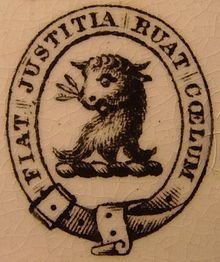
Back Fiat justitia ruat caelum ID Fiat iustitia, ruat caelum Italian Fiat iustitia, ruat caelum Latin จงประสาทความยุติธรรม แม้ฟ้าจะถล่มก็ตามที Thai 即使昊天崩塌,也要秉行公正 Chinese Fiat justitia ruat caelum ZH-MIN-NAN

Fīat iūstitia ruat cælum is a Latin legal phrase, meaning "Let justice be done though the heavens fall." The maxim signifies the belief that justice must be realized regardless of consequences. According to the 19th-century abolitionist politician Charles Sumner, it does not come from any classical source,[1] though others have ascribed it to Lucius Calpurnius Piso Caesoninus .
The concept is cited in Somerset v Stewart.[2]
- ^ "The Position and Duties of the Merchant: Address Before the Mercantile Library Association of Boston, Nov. 13, 1854". The Works of Charles Sumner. Vol. III. Boston: Lee and Shephard. 1875. p. 507.
Of these, the first is expressed in these simple words: "If the parties will have judgment, fiat justitia, ruat coelum: let justice be done, whatever be the consequence." The Latin phrase which here plays such a prominent part, though of classical stamp, cannot be traced to any classical origin, and it has even been asserted that it was freshly coined by Lord Mansfield on this occasion, worth of such commanding truth in such commanding phrase. But it is of older date, and from another mint,—though it is not too much to say, that it took its currency and authority from him. Coming from such a conservative magistrate, it is of peculiar importance. With little expansion, it says openly: To every man his natural rights; justice to all, without distinction of person, without adbridgment, and without compromise. Let justice be done, though it drags down the pillars of the sky. Thus spoke the Chief Justice of England.
- ^ Somerset v Stewart, 98 ER, 499 (1772), archived from the original.
© MMXXIII Rich X Search. We shall prevail. All rights reserved. Rich X Search